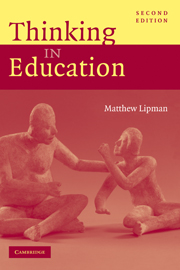Book contents
- Frontmatter
- Contents
- Preface
- Introduction to the Second Edition
- PART ONE EDUCATION FOR THINKING
- PART TWO COMMUNITIES OF INQUIRY
- PART THREE ORCHESTRATING THE COMPONENTS
- PART FOUR EDUCATION FOR THE IMPROVEMENT OF THINKING
- 9 The Transactive Dimensions of Thinking
- 10 Education for Critical Thinking
- 11 Education for Creative Thinking
- 12 Education for Caring Thinking
- 13 Strengthening the Power of Judgment
- Bibliography
- Index
13 - Strengthening the Power of Judgment
Published online by Cambridge University Press: 05 June 2012
- Frontmatter
- Contents
- Preface
- Introduction to the Second Edition
- PART ONE EDUCATION FOR THINKING
- PART TWO COMMUNITIES OF INQUIRY
- PART THREE ORCHESTRATING THE COMPONENTS
- PART FOUR EDUCATION FOR THE IMPROVEMENT OF THINKING
- 9 The Transactive Dimensions of Thinking
- 10 Education for Critical Thinking
- 11 Education for Creative Thinking
- 12 Education for Caring Thinking
- 13 Strengthening the Power of Judgment
- Bibliography
- Index
Summary
WHY NOT TEACH FOR BETTER JUDGMENT?
Expertness in judgment is generally thought to be the result of principle or of practice. Principled judgments are those guided by standards, criteria, and reasons. Teaching students to make principled judgments therefore focuses upon having them learn the principles by which their judgments are to be regulated. Judgments of practice, on the other hand, are the products of experience, and students are expected to arrive at expertness by profiting from their experience as they gradually make their judgments better and better.
Now, both of these approaches are on target. True, in theoretical fields the emphasis will be on the acquisition of principles; in fields populated by craftpersons and artists, the emphasis will be on practice; and in professional and technological fields the emphasis will be approximately equal. Obviously, both approaches are necessary. The question is – and here what I have primarily in mind is the formation of judgment in educational contexts – are they sufficient?
Before proceeding to deal at some length with this question, I am aware of another that interposes itself. It is a question many educators would feel inclined to ask, and the reasoning would run something like this: “Why are we spending all this time talking about judgment? Judgment is in no way a recognized area of educational responsibility. It has never been. Children come to us to learn – to acquire knowledge. How well or badly they apply that knowledge is up to them.
- Type
- Chapter
- Information
- Thinking in Education , pp. 272 - 293Publisher: Cambridge University PressPrint publication year: 2003



